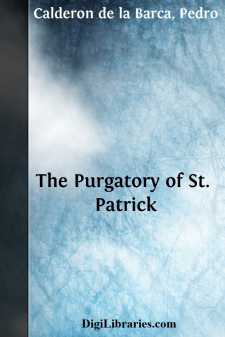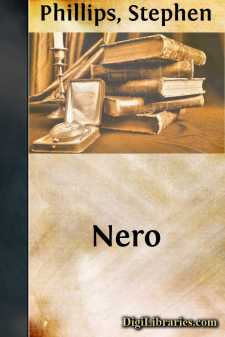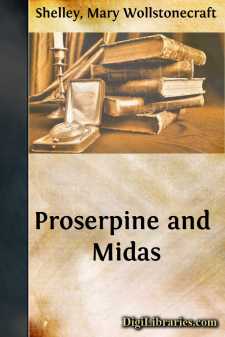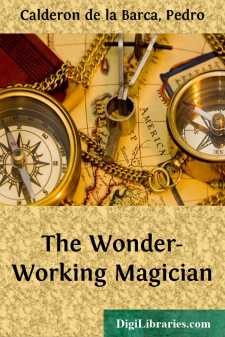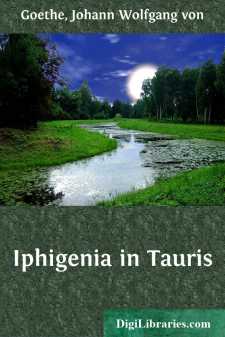Drama
- American 43
- Ancient, Classical & Medieval
- Asian 7
- Caribbean & Latin American 2
- Continental European 50
- English, Irish, Scottish, Welsh 91
- General 105
- Middle Eastern 1
- Religious & Liturgical 1
- Shakespeare 1
Ancient, Classical & Medieval Books
Sort by:
Two of the dramas contained in this volume are the most celebrated of all Calderon's writings. The first, "La Vida es Sueno", has been translated into many languages and performed with success on almost every stage in Europe but that of England. So late as the winter of 1866-7, in a Russian version, it drew crowded houses to the great theatre of Moscow; while a few years earlier, as if to...
more...
by:
Stephen Phillips
ACT I SCENE.—The scene is in the Great Hall in the Palace of the Caesars. At the back are steps leading to a platform with balustrade opening on the air, and beyond, a view of the city. [On the right of the stage is a cedarn couch on which CLAUDIUS is uneasily sleeping. On the right is a door communicating with the inner apartments. On the left a door communicating with the outer halls. [XENOPHON is...
more...
by:
Thomas Hardy
The Spectacle here presented in the likeness of a Drama is concerned with the Great Historical Calamity, or Clash of Peoples, artificially brought about some hundred years ago. The choice of such a subject was mainly due to three accidents of locality. It chanced that the writer was familiar with a part of England that lay within hail of the watering-place in which King George the Third had his...
more...
by:
Bernard Shaw
The twelfth of May, 1796, in north Italy, at Tavazzano, on the road from Lodi to Milan. The afternoon sun is blazing serenely over the plains of Lombardy, treating the Alps with respect and the anthills with indulgence, not incommoded by the basking of the swine and oxen in the villages nor hurt by its cool reception in the churches, but fiercely disdainful of two hordes of mischievous insects which...
more...
INTRODUCTION. I. ‘The compositions published in Mrs. Shelley’s lifetime afford but an inadequate conception of the intense sensibility and mental vigour of this extraordinary woman.’ Thus wrote Dr. Garnett, in 1862 (Preface to his Relics of Shelley). The words of praise may have sounded unexpectedly warm at that date. Perhaps the present volume will make the reader more willing to subscribe, or...
more...
SCENE I.—The Upper Chamber in Holyrood. The four MARIES. MARY BEATON (sings):— 1. Le navire Est a l'eau; Entends rire Ce gros flot Que fait luire Et bruire Le vieux sire Aquilo. 2. Dans l'espace Du grand air Le vent passe Comme un fer; Siffle et sonne, Tombe et tonne, Prend et donne A la mer. 3. Vois, la brise Tourne au...
more...
SCENE I. A common apartment in the Castle of Fotheringay. HANNAH KENNEDY, contending violently with PAULET, who is aboutto break open a closet; DRURY with an iron crown. KENNEDY.How now, sir? what fresh outrage have we here?Back from that cabinet! PAULET.Whence came the jewel?I know 'twas from an upper chamber thrown;And you would bribe the gardener with your trinkets.A curse on woman's...
more...
INTRODUCTION. Two of the dramas contained in this volume are the most celebrated of all Calderon's writings. The first, "La Vida es Sueno", has been translated into many languages and performed with success on almost every stage in Europe but that of England. So late as the winter of 1866-7, in a Russian version, it drew crowded houses to the great theatre of Moscow; while a few years...
more...
ACT THE FIRST. SCENE I. A Grove before the Temple of Diana. IPHIGENIA.Beneath your leafy gloom, ye waving boughsOf this old, shady, consecrated grove,As in the goddess' silent sanctuary,With the same shudd'ring feeling forth I step,As when I trod it first, nor ever hereDoth my unquiet spirit feel at home.Long as the mighty will, to which I bow,Hath kept me here conceal'd, still, as at...
more...
PREFACE. In the selection of my last Shakespearean revival at the Princess’s Theatre, I have been actuated by a desire to present some of the finest poetry of our great dramatic master, interwoven with a subject illustrating a most memorable era in English history. No play appears to be better adapted for this two-fold purpose than that which treats of Shakespeare’s favorite hero, and England’s...
more...


